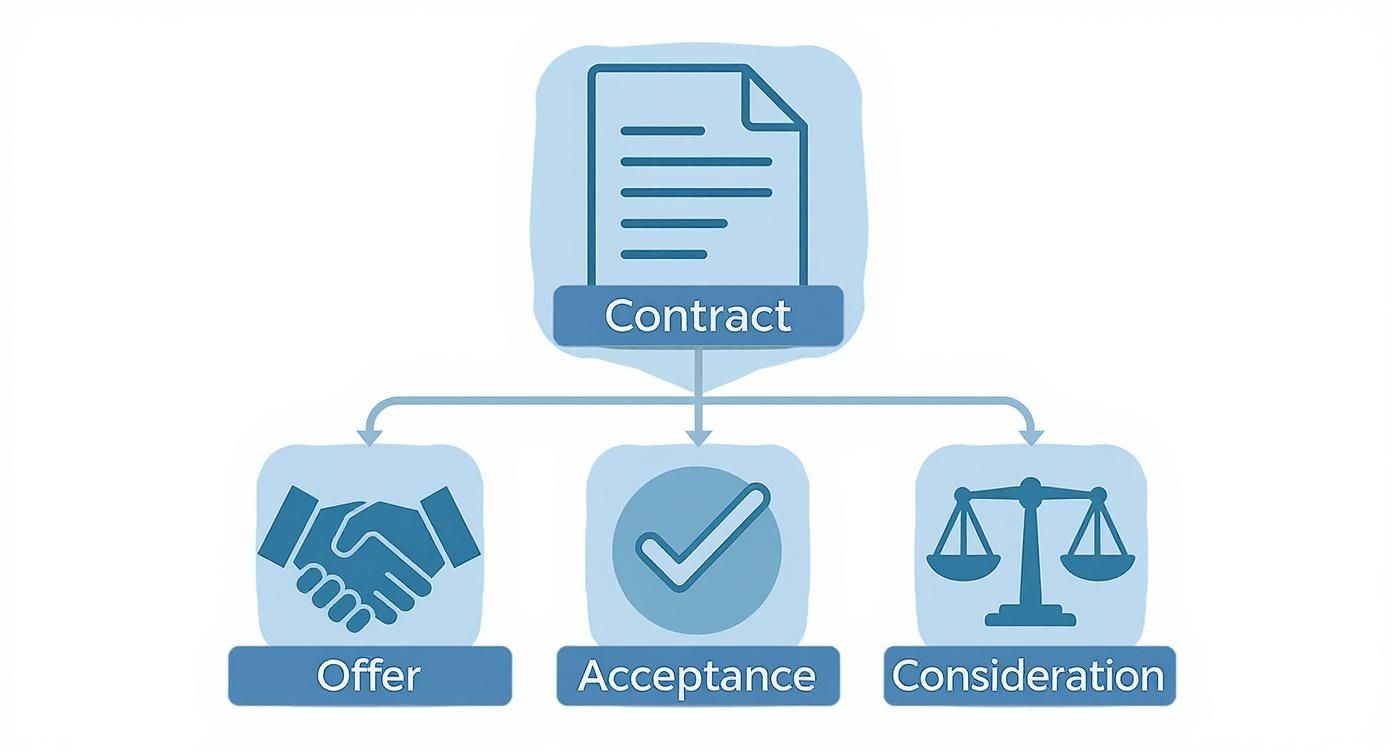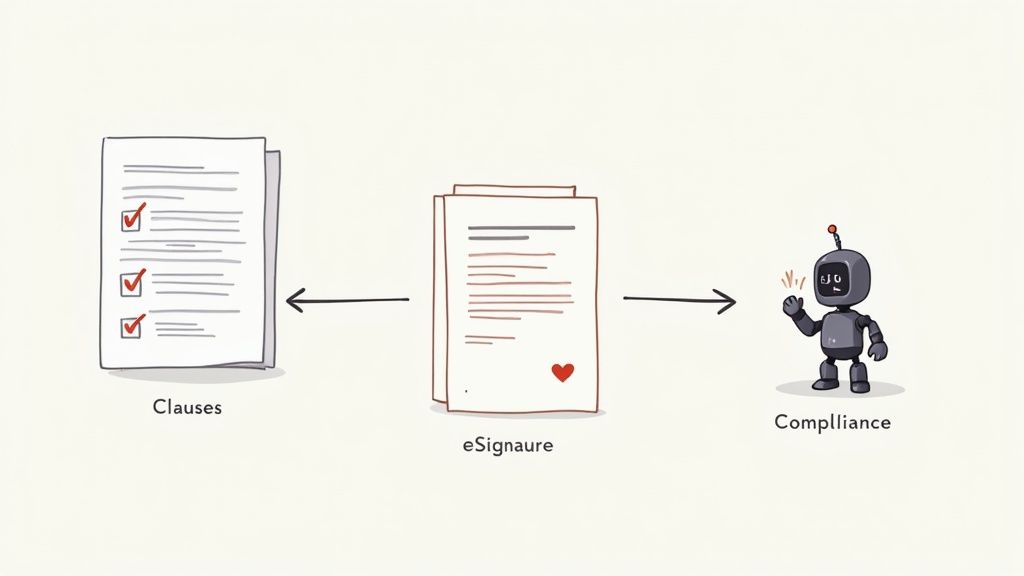Elements of a Contract: Essentials for Enforceable Deals
Learn the elements of a contract that make an agreement binding. Discover how offer, acceptance, and consideration create enforceable contracts.
Tired of nonsense pricing of DocuSign?
Start taking digital signatures with BoloSign and save money.
For a simple promise to become a legally binding contract, a few foundational elements have to be in place. The core trio—offer, acceptance, and consideration—are what transform a casual agreement into a serious commitment the law will actually enforce.
Without these, you’re left with little more than a handshake and a whole lot of risk.
What Really Makes a Contract Legally Binding
Think of the essential elements of a contract like the structural pillars holding up a building. If even one is missing or weak, the whole thing is in danger of collapsing. Getting these components right is non-negotiable for any business, whether you're a real estate agency closing a property deal or a consulting firm scoping out a new project.
Nailing these details from the start is how you prevent expensive misunderstandings and messy disputes down the road. It’s all about building clarity and security into the relationship from day one. For a deeper look at the fundamentals, resources on contract formation in business law offer some excellent context.
Before we dive into each element, let's get a high-level view.
The 7 Essential Elements of a Contract at a Glance
This table gives a quick summary of the core components required for a valid contract, which we'll explore in detail throughout this guide.
| Element | What It Means in Plain English |
|---|---|
| Offer | One party proposes specific terms for an agreement. |
| Acceptance | The other party agrees to the exact terms of the offer. |
| Consideration | Something of value is exchanged between the parties (e.g., money, services). |
| Capacity | Both parties are legally competent to enter into a contract (e.g., of sound mind, legal age). |
| Intention | The parties genuinely intend for the agreement to be legally binding. |
| Legality | The purpose of the contract must be legal and not against public policy. |
| Certainty | The terms of the agreement must be clear, complete, and not vague. |
Understanding these pillars is the first step toward creating contracts that protect your interests and stand up to scrutiny.

As the diagram shows, a solid contract starts with a clear offer, gets locked in with acceptance, and is made real by an exchange of value—what lawyers call consideration.
Modern tools are a huge help in making sure every one of these elements is clearly documented and locked down. With BoloSign, organizations can instantly create, send, and sign PDFs online, using templates and forms that ensure consistency. You're not just capturing an electronic signature; you're building a secure, timestamped digital record of the entire agreement process.
A contract is fundamentally a meeting of the minds. Every clause, term, and signature serves to document that mutual understanding, turning intention into an enforceable obligation.
This approach ensures every party acknowledges the terms, heading off confusion before it can start. With a straightforward system like BoloSign, you can manage all your agreements in one place—from client intake forms at a healthcare clinic to complex vendor contracts in a supply chain. It’s a proactive way to strengthen the legal foundation of your business, making every deal a solid platform for your professional relationships.
The Handshake of Your Agreement: Offer and Acceptance

Every contract, at its core, starts with a digital handshake—a clear offer followed by an equally clear acceptance. These two actions are the absolute bedrock of any binding agreement. An offer isn't just a casual conversation or a vague idea; it's a specific, definite proposal that lays out the exact terms one party is willing to commit to. Think of it as putting all your cards on the table.
For instance, a staffing agency sending a formal placement letter with the salary, start date, and job duties spelled out is making a clear offer. So is a logistics company that provides a detailed quote for shipping goods, complete with costs, delivery windows, and insurance coverage. The key is that nothing is left to interpretation.
What Makes Acceptance Valid
Acceptance is the unqualified "yes" to that precise proposal. For acceptance to be legally sound, it has to mirror the original offer perfectly. Any attempt to tweak the terms—like a job candidate asking for a higher salary or a client requesting a different shipping date—isn't an acceptance at all.
This is a critical distinction. Changing the terms instantly creates a counter-offer, which legally kills the original proposal and puts a brand new one on the table. The negotiation effectively starts over. Managing this back-and-forth is an art, and you can find a complete guide on our blog explaining how to redline a contract without losing your mind.
An offer is the question, and acceptance is the definitive answer. A counter-offer changes the question entirely, requiring a new answer to form an agreement.
This is exactly where deals fall apart. Misunderstandings over what was offered versus what was accepted are a ridiculously common source of conflict down the road.
Locking in the Agreement with eSignatures
This constant volley of offers and counter-offers is where a modern digital signing solution like BoloSign becomes indispensable. When you send a PDF or a template for an eSignature, you're not just collecting a scribble on a line. You're creating a permanent, timestamped record of the final, agreed-upon offer and its explicit acceptance.
BoloSign’s secure platform captures the entire signing ceremony, giving you an indisputable audit trail. It completely eliminates any "he said, she said" confusion and solidifies the first crucial element of your contract. This kind of clarity is invaluable for professional services firms finalizing a project scope or for educational institutions formalizing enrollment agreements.
With BoloSign, you can manage unlimited documents at one fixed price, making it up to 90% more affordable than alternatives like DocuSign or PandaDoc. It's a simple, efficient way to make sure every single agreement you create starts on a foundation of absolute clarity and legal certainty, no matter how many you handle.
The Value Exchange That Powers Your Contract

Once you’ve nailed down a clear offer and acceptance, you hit the next non-negotiable element of a contract: consideration. It’s a legal-sounding term, but at its core, it’s just the “what’s in it for me?” part of the deal.
Think of it as the value that each side promises to give—and receive—to make the agreement legally stick. Without this mutual exchange, a promise is just a promise, not an enforceable contract. Consideration is what ensures both parties have some skin in the game.
And no, it doesn't always have to be about money.
What Counts as Valid Consideration
So, what exactly can be exchanged? Consideration can take many forms, as long as it has some real, measurable value. The crucial part is that each party must give something up.
- For a professional services firm: Their expertise and time are exchanged for a client's payment.
- In a real estate transaction: One party provides the property, while the other provides the cash.
- For a logistics company: They offer shipping and delivery in return for a fee.
This two-way street is what elevates a business agreement beyond a casual favor or a simple gift.
The Sufficiency vs. Adequacy Rule
Here’s an important legal principle to wrap your head around: consideration must be sufficient, but it doesn't need to be adequate. This means it just has to have some genuine, recognizable value. The law generally won’t step in just because someone got a much better deal.
As long as there's a real exchange and no signs of fraud or coercion, the contract is solid. For example, selling a vintage car for $1 is legally sufficient consideration, even if the car is actually worth thousands. The court doesn’t act as a price police.
Consideration is the price one party pays for the other party's promise. It ensures the agreement is a two-way street, not a one-sided declaration.
This is why getting every agreement in writing is so critical. With BoloSign's unlimited document plan, your organization can formalize every value exchange without the steep costs charged by competitors. Whether it’s a major sales contract or a simple service agreement, you can create, send, and sign PDFs online to lock in the terms. This approach ensures all of your agreements are backed by clearly defined consideration, offering an affordable way to secure every business relationship.
The Hidden Pillars of a Valid Contract
Beyond the big three of offer, acceptance, and consideration, a few other elements act as the silent guardians of a contract’s integrity. Think of them as the final quality checks that determine if an agreement can actually hold up under pressure: intention, capacity, and legality. People often take them for granted, but ignoring them can bring an otherwise perfect contract crashing down.
First up is intention—the mutual understanding that you're creating a legally binding relationship. It’s what separates a casual promise over lunch from a formal business deal. For a contract to be valid, both sides must have genuinely intended for their agreement to have real legal weight and consequences.
Next, there's capacity. This just means that everyone signing the contract is legally able to do so. They need to be of legal age, mentally sound, and not under any kind of pressure or influence that would compromise their judgment. A contract signed by a minor, for instance, or someone who clearly doesn't understand what they're agreeing to, is built on shaky ground and can easily be voided.
Keeping It Legal and Compliant
Finally, we arrive at what might be the most important pillar: legality. The entire point of the contract must be lawful. An agreement to do something illegal is worthless from the get-go. This is a huge deal in regulated fields like healthcare, where a services agreement isn't just a business document—it has to align with strict rules like HIPAA to be enforceable.
An agreement without legal intention, capacity, and a lawful purpose is like a building with no foundation—it might look fine on the surface, but it's destined to collapse under pressure.
This need for legally sound agreements isn't just a local issue; it's a global standard. It's why around 40% of all international business and financial deals are governed by English law, which is known for its clarity and efficiency in commercial disputes. In fact, courts like the London Commercial Court are so effective that they handle over half of all contested global commercial trials, often wrapping them up in less than a week. You can dig into more of these trends in the Law Society's international data report.
How AI Provides a Critical Safety Net
Manually verifying these hidden pillars for every single contract is a massive time sink and, frankly, an open invitation for human error. This is where modern tools like BoloSign's AI contract review provide a much-needed safety net. Its contract intelligence can instantly flag potential red flags—like terms that suggest a lack of clear intention or clauses that might stray into compliance grey areas.
By running this automated first pass, you catch risks before a signature ever hits the page. BoloSign helps ensure your agreements are built on a solid legal foundation, giving you the confidence that every contract isn't just signed, but truly enforceable. This approach to contract automation is about more than just speed; it's about protecting your business and keeping things moving smoothly.
Managing Contract Elements with AI and Automation
Let’s be honest. Manually tracking every essential element of a contract across dozens—let alone hundreds—of agreements is a recipe for disaster. It’s how crucial details get missed, compliance risks creep in, and revenue gets left on the table.
But this is where we shift from theory to practice. Today, technology offers a powerful way to manage these critical components with both precision and speed. AI-powered contract automation isn't just a buzzword; it's fundamentally changing how businesses get deals done.
With a platform like BoloSign, teams can finally wrangle the entire contract lifecycle in one unified space. Forget juggling endless email threads and messy spreadsheets. You can create, send, and manage all your agreements seamlessly, ensuring every element—from a clear offer to final acceptance—is properly documented and secure.
Think about a busy real estate agency. Instead of starting from scratch every time, they can use standardized templates for purchase agreements, guaranteeing every deal includes the necessary legal clauses. Or a logistics company that can automate its entire client onboarding process, using forms that capture all required information and trigger an eSignature request instantly.
Streamlining Review with Contract Intelligence
One of the biggest leaps forward is in the review process itself. Artificial intelligence can now analyze contracts with an efficiency that’s almost hard to believe. In fact, research shows AI can perform contract analysis with 10% greater accuracy than trained lawyers, finishing a review in just 26 seconds compared to the 92 minutes it takes a human. That massive gain is reshaping how legal and business teams operate, a trend you can explore further with these contract management insights.
BoloSign’s AI contract review brings this power directly into your daily workflow. The system automatically scans your documents to:
- Identify missing clauses: It instantly flags when critical sections like indemnification or termination are completely absent.
- Spot risky language: The AI highlights ambiguous or non-standard terms that could easily lead to disputes down the road.
- Ensure consistency: It verifies that key details like names, dates, and dollar amounts are correct and consistent throughout the document.
Think of it like this: AI acts as an intelligent first line of defense, catching potential errors and oversights that the human eye might miss after hours of staring at a screen. This frees up your team to focus on strategic negotiation rather than tedious proofreading.
This automated check is a game-changer. It helps your team confirm that all the foundational elements of a contract are present and correctly stated before an agreement ever goes out for signature. You can learn more about how this technology works in our guide to AI contract review software.
The best part? This level of advanced functionality is no longer reserved for massive enterprises with deep pockets. BoloSign makes it accessible by offering unlimited documents, templates, and team members at a single fixed price. This makes it up to 90% more affordable than alternatives like DocuSign or PandaDoc, putting powerful contract intelligence within reach for any business ready to grow.
Keeping Your Digital Agreements Secure and Compliant

Making sure you’ve nailed all the core elements of a contract is a huge step, but it's really only half the battle. In a world where business runs on digital, a signed agreement is only as strong as its security and compliance.
For any business operating in the US, Canada, Australia, or the UAE, adhering to strict digital transaction laws is non-negotiable.
Regulations like the ESIGN Act, eIDAS, HIPAA, and GDPR aren’t just suggestions; they set the legal standard for what makes a digital signing solution trustworthy. Getting this wrong doesn't just put your data at risk—it can completely invalidate your agreements and expose your company to some serious penalties.
Building Trust Through Rock-Solid Compliance
In industries that handle sensitive information, compliance is the absolute bedrock of trust. Think about healthcare providers managing patient intake forms or educational institutions processing enrollment data. For them, using a platform built with these standards at its core isn’t just a good idea; it’s essential.
BoloSign was designed to meet these strict international requirements, including ESIGN, eIDAS, HIPAA, and GDPR, providing legally binding eSignatures you can count on. Every document signed comes with a comprehensive audit trail that captures timestamps, IP addresses, and every single action taken. This creates an unshakeable record that proves the integrity of your agreement.
Poor contract management is a silent profit killer. Some estimates show that value leakage from inefficient contract processes can cost a company as much as 9% of its annual turnover.
By prioritizing security and compliance, you’re not just protecting your data—you’re safeguarding the validity of every agreement and protecting your business's future.
This commitment to security makes BoloSign a reliable choice for organizations of all sizes. And to ensure the integrity of your digital agreements, it's also smart to be aware of the top smart contract audit tools available. Understanding the full ecosystem of digital security helps you make more informed decisions. You can learn more about centralizing your agreements in our complete guide on what is contract management software.
Common Questions About Contract Elements
Even when you understand the theory, practical questions always come up, especially when dealing with modern digital agreements. Here are a few common ones we hear all the time.
Are Electronic Signatures Legally Binding?
Absolutely. In most parts of the world—including the U.S. under the ESIGN Act, Canada, and Australia—electronic signatures carry the exact same legal weight as a handwritten "wet ink" signature.
The real test isn’t the signature itself, but proving the signer’s intent and ensuring the document wasn't tampered with. That’s why a secure digital signing solution like BoloSign is so important. It creates a complete audit trail with timestamps and IP addresses, making every eSignature authentic, compliant, and fully enforceable in court.
What Happens if a Contract Is Missing an Element?
If an essential piece of the puzzle is missing, the agreement could be "void" (meaning it was never valid to begin with) or "unenforceable" (a technically valid contract that a court simply won't uphold).
A classic example is an agreement without consideration. It's often just an empty promise with no legal teeth. Using contract automation software with smart templates is a simple way to make sure all the core elements are included every single time. It's a foundational step that dramatically cuts the risk of creating a faulty document.
How Does AI Actually Help Review Contracts?
Think of AI contract review tools as an expert second pair of eyes that can scan a dense document in seconds. AI is trained to spot potential trouble, like missing clauses, vague language, or terms that deviate from your company’s standard policies.
For instance, BoloSign's contract intelligence can instantly verify that the offer, acceptance, and consideration are clearly defined within the text. It automates that crucial first-pass review, freeing up your team to focus on high-level strategy instead of manual proofreading.
This ensures your agreements are built on a solid foundation long before they ever get to the negotiation table.
Understanding these core elements is the first step toward creating secure, enforceable agreements that protect your business. With BoloSign, you can manage the entire contract lifecycle—from creation to signature—with AI-powered tools designed to reduce risk and get deals done faster.
Ready to see how simple and affordable modern contract management can be? Start your 7-day free trial today.

Paresh Deshmukh
Co-Founder, BoloForms
21 Nov, 2025
Take a Look at Our Featured Articles
These articles will guide you on how to simplify office work, boost your efficiency, and concentrate on expanding your business.

Compare the best AI contract review tools for 2025. See features, benefits, and practical tips to implement them at scale. Explore BoloSign’s unified solution.
Paresh Deshmukh
Co-Founder, BoloSign

Learn if clickwrap agreements are legally binding, how they work, and key best practices for enforceability.
Paresh Deshmukh
Co-Founder, BoloSign
Ready to streamline your contract management with AI?
Contact Sales
AI assistant to draft, review, and eSign contracts on autopilot for fastest growing companies.
Email: support@boloforms.com


Sales Inquiry

AI assistant to draft, review, and eSign contracts on autopilot for fastest growing companies.
Email: support@boloforms.com


Company
Solutions
Resources
Legal & Security
Sales Inquiry